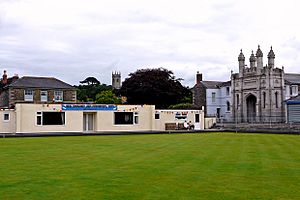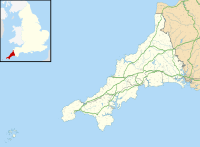Helston Castle facts for kids
Quick facts for kids Helston Castle |
|
|---|---|
| Helston, Cornwall, England | |

The site of the castle is now a bowling green
|
|
| Coordinates | 50°06′00″N 5°16′40″W / 50.10000°N 5.27778°W |
| Type | Possibly a fortified manor house |
| Site information | |
| Condition | Vanished |
Helston Castle was a medieval castle built in the late 1200s. It was located in Helston, Cornwall, England. The castle was built for Edmund, 2nd Earl of Cornwall.
By the end of the 1400s, the castle was already in ruins. Today, the site where it once stood is a bowling green and the Grylls Monument. This area is at the bottom of Coinagehall Street in Helston. Not much is known about Helston Castle. However, experts believe it might have been a strong, fortified manor house.
Who Built Helston Castle?
Helston Castle was built for Edmund, 2nd Earl of Cornwall. Edmund was a very important and rich person. He was the grandson of King John. He also served as a regent for his cousin, King Edward I. A regent is someone who rules a country when the king or queen is too young or unable to rule.
As the Earl of Cornwall, Edmund controlled most of Cornwall. He earned a lot of money, about £8,000 each year. This was a huge amount of money back in the 1300s!
What Was Helston Like?
Helston is a town in south-west Cornwall, England. It became an official town in 1201, thanks to a special paper from King John. Helston became even more important during King Edward I's time.
It became a stannary town. This meant it was a special place where tin mined in Cornwall was weighed and taxed. Helston also had the right to send two people to represent it in Parliament. These people were called members of parliament.
When Was the Castle Built and Where Did It Stand?
The castle was built sometime in the late 1200s. It was made for Edmund, the Earl of Cornwall. People have different ideas about what the castle was used for. Some historians, like Charles Henderson, think it was a strong manor house. A manor house was a large country house, often the main home of a lord.
The castle's location was also important. It overlooked a river valley. This valley might have been connected to the sea back then. This suggests the castle could have been built for defense.
By 1478, when a writer named William Worcester visited, the castle was already falling apart. About 50 years later, another writer, John Leland, said there were only small signs of the castle left. Today, Helston Castle is listed as a "vanished castle." This means it no longer exists.
The place where the castle once stood is now a bowling green and the Grylls Monument. You can find it at the bottom of Coinagehall Street in Helston.
 | James Van Der Zee |
 | Alma Thomas |
 | Ellis Wilson |
 | Margaret Taylor-Burroughs |


